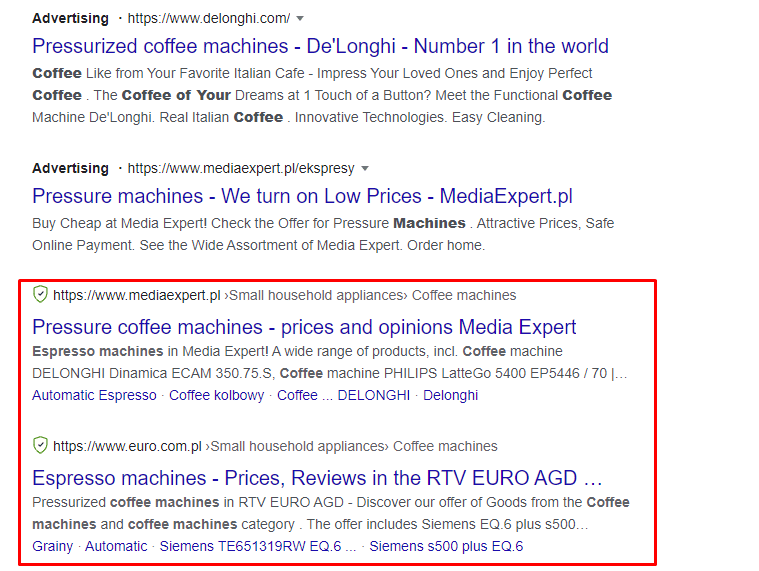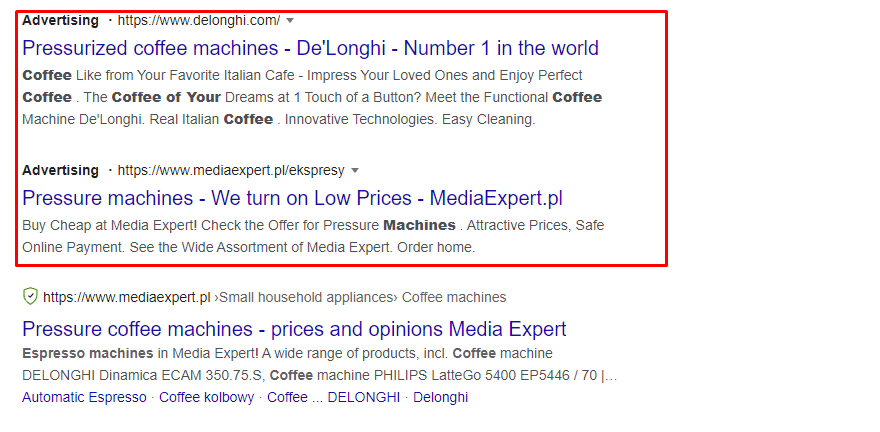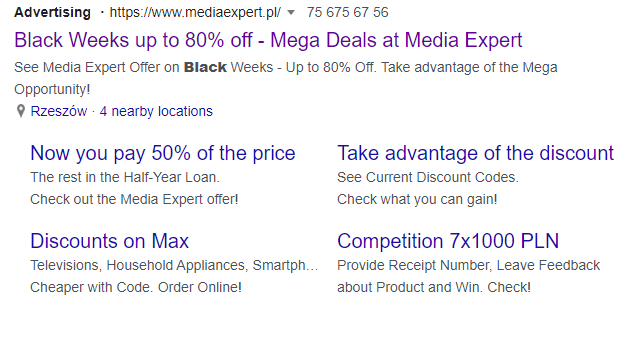Entrepreneurs and site owners who want to show up high in Google often face a dilemma: use SEO or SEM? Which approach is better and how do they really differ? To answer these questions, let’s start with the basics.
The Google search engine distinguishes between two types of search results: free (organic) and paid. Organic search results achieve their positions based on the quality of a site’s optimization (SEO) and the content it contains. Paid search results, on the other hand, are those that are displayed above the organic results with the additional description “Advertising,” and efforts to optimize them are called SEM.
SEO focuses on organic search results and, from Google’s point of view, they are free. Of course, SEO activities can be paid for and then the positions of our site will be handled by specialists in this field.
SEM activities focus on paid results, which require a budget, and its amount depends on the effects we want to achieve. In addition, they give wide possibilities of control and modification, so they can be adjusted to our requirements on an ongoing basis. However, there are more subtle differences between the two systems that you need to know in order to make an informed choice about when and which approach to use – SEO or SEM.
What is SEO?
.
SEO (Search Engine Optimization) are activities of optimizing a website for search engines and, as a result, gaining high positions in organic search results. Obviously, pages that rank high in search results have the greatest chance of being clicked on by a user.
Site optimization can be divided into two main threads: on site and off site.
On site optimization focuses on site speed, correct display, proper structure, unique content, internal linking, and improving site indexation.
Off site optimization deals with all external aspects of the site, such as: external (back) links, downloaded resources, and much more. The quality of backlinks and referring domains plays an important role.

Search engine optimization is an interdisciplinary field, as it involves front-end, back-end and marketing issues. In addition, effective SEO activities require knowledge of web analytics. Google’s ever-changing algorithms and guidelines force constant work and the acquisition of new knowledge.
The search engine uses many ranking factors in its algorithm, on the basis of which search results are built. That’s why it’s so important to constantly keep up with SEO news and new proven solutions. Google does not always explicitly say what elements matter in ranking – often we only find out from tests and analysis by independent specialists.
It is worth noting at this point that as long as SEO activities are not outsourced to an agency or specialist, they do not generate financial costs.
What is SEM?
.
SEM (Search Engine Marketing), orsearch engine marketing. It is a series of activities aimed at increasing the visibility of a website in a search engine, but also promoting a company online. SEM mainly refers to paid search results.

In other words, SEM is marketing paid sponsored links, which consists – in short – in the configuration and optimization of advertising campaigns. The most common tool for running advertising campaigns is Google Ads. The system, based on specific key phrases, displays ads above organic search results. Search ads, thanks to extensive configuration options, allow you to target your campaign to a specific group.
Traffic gained from advertising campaigns are very often customers who, in the case of online stores, make a purchase. Thanks to such promotion, you can very quickly get the first orders and feedback, and most importantly, the first profits. Ads will also work very well for promoting a new site or a new business.
What is PPC?
.
PPC is an abbreviation for Pay Per Click and stands for model of billing for paid advertising campaigns. Because of the great possibilities of giving form to advertising and precise targeting, site owners often choose this form of promotion. The principal pays for the ad only when the user clicks on it. The ad displays themselves do not generate costs.
PPC campaigns have several key advantages:
-
Budget control
.
-
Payment for Effect
-
Fast results
-
Measurable results
-
Fast results
-
Flexibility
.
.
.
The ability to get quick results with a high degree of control is a very good way to promote a site or service. However, PPC has several advantages:
-
Action only “in the here and now”
.
-
Large costs for more competitive phrases
-
Daily monitoring required
-
Possibility of budget “clicks” by competitors
.
.
PPC campaigns are ideal as a form of promotion for a new website, company or service, where quick results enable you to attract your first customers and generate profit.
SEO vs SEM – what are the differences between them
.
The main difference between SEO and SEM is that SEO activities do not require any financial outlay (assuming you don’t outsource them to a specialist or agency), while SEM activities are always paid, even when you don’t use external specialists.
Running Google Ads campaigns requires an adequate budget. The cost per click of an ad can vary depending on the industry and competition. Therefore, the amount of budget you have at your disposal plays a big role here. Paid ads are to some extent limited by such elements as:
- the size of the budget
- the number of key phrases
- geographic area
.
.
.
These limitations are based on the goals that will be set when launching the ads.
SEO is a long-term effort and you have to wait for results. There are many free tools available to quickly analyze and improve the structure of the site, or its content. However, the results you will see in Google search results take time.
In contrast, the effects of SEM, unlike SEO, are seen very quickly. Sponsored links are displayed first in search results, as soon as the ad campaign is launched.
Another very important difference is that organic search results will be displayed to all users. Sponsored links appear only to users who are in your defined target audience – that is, people who are potentially interested in a particular service or product.
The effects of SEO can be seen in increased visibility for a wide variety of phrases that you have not necessarily predetermined. This is because the search engine will display our site on many phrases besides the main one we tried to position for – when it thinks the site is thematically related to them. SEM, on the other hand, doesn’t work that way. When planning keywords for a campaign, you can’t count on the ad accidentally “going in” on some additional, related phrases to your site.
Unlike SEM, SEO efforts do not offer any guarantees of getting first rankings. A lot depends on how the optimization of your site and content goes, what actions your competitors will be taking at the time, and what changes are made to the ranking algorithm. SEM activities, on the other hand, guarantee display in the first search results, but this effect is lost immediately when the budget is exhausted or the campaign is turned off.
SEO vs SEM – similarities
.
Despite the many differences between SEO and SEM, similarities can be noted between themThe main goal with both SEO and SEM is to improve search engine visibility and, as a result, gain more traffic to a website or online store.
Aiming for sales is another common goal of SEO and SEM. E-commerce type sites aim to generate profit. Regardless of the activities carried out, both SEO and SEM indirectly lead to increased sales.
Keywords is another common feature of SEO and SEM. In both cases, site owners mainly choose the most profitable phrases that can bring the most profit. This applies to short phrases as well as longer, more specific ones, referred to as long tail phrases. Developing a meaningful niche (just defined by keywords) provides opportunities for quick profit. Keyword phrase analysis allows you to check the popularity of a keyword and how often it is searched.
The second very important element of phrase analysis is competition. Large and strong competition will make SEM costs high, while SEO will require a lot of time and effort – and probably won’t do without agency support.
That’s why it’s worth considering choosing niche, more specialized phrases that are also searched for, with much less competition. This will enable you to attract more customers at a lower cost.
SEO vs SEM – which will bring faster results?
.
The effects of SEM can be seen almost immediately, as the ads are displayed as soon as the campaign is launched. You can turn them on and off at any time, depending on your budget.
SEO, on the other hand, takes quite a while to reach high positions in search results – a lot depends on the industry and the difficulty of the keywords, but it is generally accepted that you have to wait from 3 to 9 months for SEO effects.
In addition, SEO requires constant work and analysis to adjust actions to newer and newer ranking factors.
It very often takes several months to implement an SEO strategy, and only then are the first effects noticeable – however, ran already-built page ranking position can last a long time. Therefore, in order to achieve quick results, the best solution will be SEM, which allows you to carry out a promotional campaign in a very fast and controlled manner. SEO is an option for the more patient, but this patience is rewarded with much more lasting results.
SEM gives us ample opportunities to target ads to specific groups of users who may be interested in our service or product offerings. Thus, it increases the chances of attracting new customers. This is especially important when the phrases we care about are very competitive. The right size of the budget will allow us to display ads despite the high competition.
SEO vs SEM – which is more expensive?
.
SEO activities are activities that do not need a budget, only the right knowledge and time. Even buying access to paid tools and outsourcing all SEO activities to an agency or specialist will generate costs on the order of an employee’s monthly salary. Of course, a lot in this regard depends on the characteristics of the industry and competition – they will determine the scope of work needed and the time it will take to achieve the desired results.
SEM activities, on the other hand, are based on a budget and the performance of any activities requires fees. Monthly costs of SEM activities are based on the number of clicks on a particular phrase, as well as the cost per click of an ad..
The cost per click can vary – it also depends on the competition and the click-through rate. The bidding system will display the campaigns of those advertisers who give a higher amount per click on the ad.
Assuming that we are interested in a very popular phrase, the number of monthly searches for which is about 30 thousand, and the cost per click is only PLN 0.25, we will calculate the monthly cost of activities according to the formula: number of ad clicks multiplied by the cost per click.
As a result, with 1,000 clicks (that is, 1 out of 30 people to whom the ad was displayed clicks), the total cost of the campaign will be PLN 250.
Of course, we can outsource all SEO activities to specialists, who, using the latest trends and knowledge, can get much better results than if we did it ourselves. Costs for such services vary widely, as they depend on the scope of services, as well as their intensity (e.g. content creation and publication). However, if we look at the business in the long term, the cost of SEO activities in relation to the effects they bring will be less than the cost of SEM..
Depending on the choice of key phrases, in terms of their popularity and competitiveness, SEM costs will be higher or lower. Nevertheless, in sum, SEM activities will be more expensive compared to SEO. Let’s also consider that if our brand is well-known or we share knowledge in a particular field (e.g. on company blog), links to our site will be shared more often by web users. This is how natural linkbuilding is created – a factor that has a very positive effect on SEO, while costing nothing.
When SEO is better than SEM?
.
SEO activities will be a better solution when running an online store, where the number of sub-pages and phrases is huge. Long-term actions will allow you to gain high positions for niche and specialized phrases. With less competition, it will be possible to achieve better ranking positions for more general phrases.
In addition,SEO activities make it possible to improve the visibility of the entire store on many different phrases, and not only on the phrases that we have chosen. This gives us extensive opportunities to gain organic traffic from the many different keywords that appear on our site.
The ads will appear only on the keyword phrases we have specified, and by being targeted to a specific group, can leave out many people. In many cases, even people who are not in our assumed target audience may make a purchase. Organic search results (SEO), on the other hand, are shown to all users who type in a specific phrase, which means we can gain a wider range of potential customers.
SEO will be a good solution if the range of key phrases from which we want to attract traffic to the site is very large. In addition, we care about high visibility of the entire site in search results. This will be especially true for sites that have a blog and cover industry topics. The search engine itself will choose the phrases with which a particular site is associated and will be displayed in the ranking.
SEM activities, on the other hand, require the identification of specific phrases, and a large number of them is associated with having a large budget. Therefore, SEM will work well for a certain number of phrases that we care about the most.
When is SEM better than SEO?
.
Because SEM activities allow you to achieve results in a short period of time,they work very well for seasonal promotions. Using paid campaigns, especially when you are not an industry leader, allows you to temporarily rank at the top of search results. An example of when SEM will be better than SEO could be Black Friday promotions.

In this case, SEO efforts would have to be started many months in advance to provide adequate benefits. In addition, we can edit the ads at any time, which gives a wide range of possibilities to adapt the offer to the available supply.
SEM activities will also work much better in the case of opening a new business, launching a new site, online store, where competition for key phrases is high. The use of paid solutions makes it possible to attract the first customers and get the first reviews.
Businesses widely use SEM to promote specific products or categories of products on offer.
SEO, SEM, or both? Which one should I choose?
.
SEO and SEM produce different results, and there is no universal answer to which is better. Both support each other, with different paths leading to the same goals. The most common choice is to use both solutions: SEO and SEM.This way, both channels of promotion support each other in achieving the same goal, which is sales.
SEO allows you to improve your visibility on a large number of phrases, which can grow naturally all the time (adding new pages, new publications, etc.), while SEM allows you to promote quickly. This is very good for promotions, events, or other seasonal campaigns.
However, it should not be forgotten that many users ignore displayed ads, focusing only on organic results. Therefore, SEO strategies allow you to reach a wider range of users and get more traffic.
Thanks to SEM, you can get specific results very quickly, which not only allow you to target advertising, but also allow you to analyze a new market or industry.In the long term, SEM is the ideal complement to organic traffic acquisition. Very competitive keywords require a huge amount of work and time, so SEM in this case will work very well as a complement to SEO.
Summary
.
It’s worthwhile to constantly analyze the results of specific SEO and SEM activities all the time, which the free Google Analytics tool allows you to do. This allows you to very accurately compare the various channels of traffic acquisition on the site. In addition, the tool allows you to determine a lot of important information about users visiting our site, such as:
- geographic location
- keywords through which they came to our site
- referring sites
- demographic data
- and much more
.
.
.
.
Such data allows you to more accurately target your SEM efforts to the right audience, and allows you to choose the right strategy in your SEO efforts.
The choice of specific activities also depends very much on the industry and competition, where SEO and SEM activities can be evenly conducted. SEM can be a support for SEO or vice versa. Therefore, choosing the right strategy is worth consulting with specialists, which will allow you to get the best results, as well as optimize costs.
 Piotr Krzyśko
Piotr Krzyśko